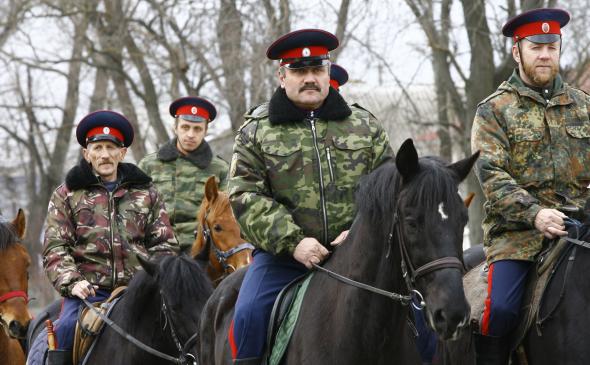Many of the pro-Russian militants occupying government buildings in eastern Ukraine are being referred to in the media—or at least are referring to themselves—as Cossacks. Between this and the role Cossacks played in policing the Sochi Olympics—notably their filmed attack on members of Pussy Riot—the Cossacks have made a fairly dramatic return to the world stage this year.
To non-Russians, this reads as a bit antiquated—as though “Janissaries” or “Hussars” were suddenly playing a significant role in modern warfare. But the roots of the Cossack revival have been apparent for a while now.
Not quite an ethnic or linguistic group—though they are nearly all Orthodox Christians—but more than just a military unit, the Cossacks trace their roots back to nomadic groups—either escaped serfs or descendants of Tatar tribes, depending on which account you read—who spread throughout southeastern Russia and Ukraine during the 15th and 16th centuries.
Though once openly rebellious against Tsarist rule, they were integrated over time into the Russian military and played a key role in securing the Russian frontier, “pacifying” the Muslim tribes of the Caucasus, and beating back Napoleon’s forces. In Russian culture they play a role similar to cowboys and were subjects for writers including Gogol, Tolstoy, and Pushkin.
Outside of Russia, they’re better known for leading Tsarist-era anti-Semitic pogroms.
Having mostly fought on the side of the anti-Bolshevik White Army during the Russian civil war, the Cossacks were treated brutally under the Soviet Union—tens of thousands were killed or deported under the Bolsheviks’ “de-Cossackization” campaign—however, they’ve made a cultural and political comeback during the post-Soviet era.
It began with Boris Yeltsin signing a number of decrees recognizing special rights, including the right to bear arms, for Cossack groups, but their re-emergence has accelerated under Vladimir Putin, who has made them something of a symbol of his conservative nationalist ideology. In 2005 Putin signed a bill allowing registered Cossack organizations to select members of special Cossack units in the Russian military and giving himself the right to appoint Cossack generals.
Cossack military schools have been formed. Cossack patrols have been policing cities in 19th-century military garb, including Moscow. In Krasnodar, home to Sochi, 1,000 Cossacks were put on the government payroll ahead of the Winter Olympics.
They’ve also at times served as conservative cultural enforcers, policing ethnic minorities from southern Russia and leading campaigns against controversial artwork including Pussy Riot and a staged reading of Lolita in St. Peterburg.
Putin has promoted the use of Cossacks as a police force, saying they’re often more efficient than the official police. Critics charge that they’re also less accountable than the official police and that the modern day Cossacks, are hostile to non-Russian ethnic groups, and have little actual connection to the fabled warriors of yore.
Be that as it may, quite a few people have enthusiastically embraced the identity. In 2010 Cossacks were counted as a separate ethnicity for the first time, and about 650,000 Russians declared themselves members of the group. Cossack leaders say there may be as many as 2.5 million worldwide. But not all governments have been as enthusiastic about the Cossack revival as Russia. As Simon Shuster of Time recently wrote, things are a bit different in Ukraine:
Ukraine’s succession of leaders, regardless of whether they leaned toward Russia or the West, have treated the local Crimean Cossacks with great suspicion. Their commanders in Crimea have spread militant notions of Slavic unity among their young cadets. All of that has attracted scrutiny from Ukraine’s security services in recent years. Under the rule of President Viktor Yanukovych, a Russia-leaning leader who was deposed in a revolution last month, Crimea’s leading Cossacks were investigated for training paramilitary groups and speaking out in support of separatism, both of which are illegal in Ukraine. Some of them have had their Cossack training camps raided by police in search of weapons. Others have been deported to Russia on charges of inciting ethnic hatred.
The annexation of Crimea presents local Cossacks with the opportunity to win the favored status that their cohorts in Russia have been enjoying for years. The self-identified Cossacks taking part in the takeovers in eastern Ukraine may be hoping for the same.
